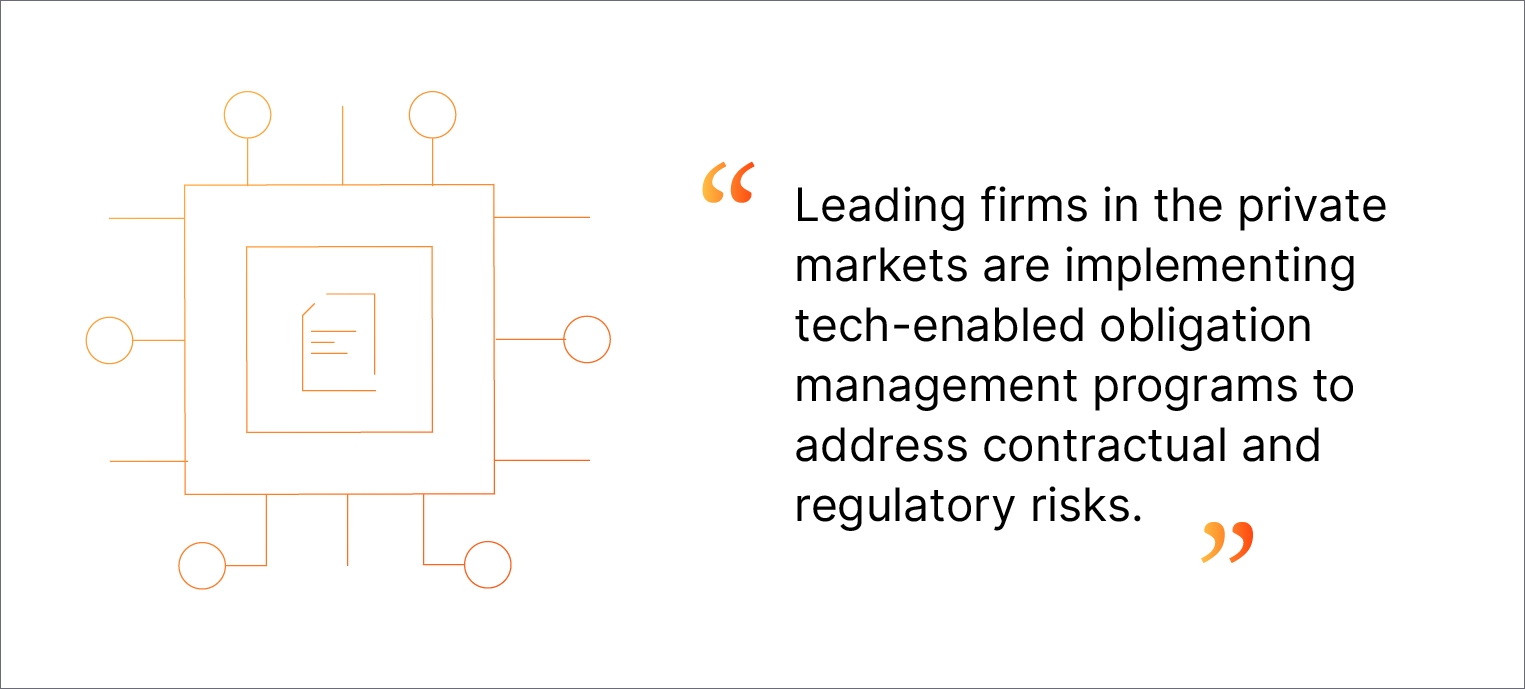Not all private fund managers have fund obligation management programs as sophisticated as they and their investors are. Despite their industry expertise, too many managers have yet to adopt the legal technology and processes necessary to build mature, proactive obligation management programs. They’re left relying on immature compliance programs that create unnecessary risks, including noncompliance, breach of contract claims, damages, regulatory fines, and reputational damage.
Unfortunately, while immature compliance programs persist, side letters are becoming more common and complex, and firms are facing heightened regulatory scrutiny. Both factors increase the importance of effective methods to ensure regulatory and contractual compliance.
Private fund managers should review the legal tech solutions and processes they use to track and comply with fund obligations. They may have an immature and reactive obligation management program with significant room for improvement.

Immature obligation management programs
Managers dependent on immature and reactive obligation management programs end up:
- Using manual and repetitive processes
- Relying heavily on spreadsheets and compendia
- Lacking defined workflows
- Lacking assigned tasks and accountability
- Sending ad hoc questions and requests to outside counsel
- Spending considerable amounts of money on outside counsel
- Lacking real-time visibility into fund obligations and compliance
- Reviewing fund obligation compliance irregularly
Immature fund obligation management is reactive. It requires someone to raise a question or concern before determining whether the firm is complying with a specific obligation. As a result, commitments to investors might fall under the radar, eventually damaging the firm’s relationship with investors.
Evolving obligation management programs
Many asset management firms realize the risks of immature processes and attempt to move beyond them.
Some firms implement legal technology, even going so far as to invest in custom software because generic solutions aren’t well-suited to asset managers’ responsibilities. Custom software might be an improvement, but it costs considerable time and money to develop, implement, and maintain.
Along with technology, firms might attempt to define contract compliance workflows, including assigning tasks to specific individuals. These workflows and assignments can be difficult to sustain without the right software.
Some firms rely on an internal or external subject matter expert (SME) to manage their obligations. While a dedicated stakeholder may improve compliance, they create a single point of failure. If the SME switched roles or left the manager or law firm, the private fund manager would have to rebuild its internal expertise and compliance workflows.
Despite the improvements made within an evolving obligation management program, private fund managers continue to rely on outside counsel, driving up costs. Ultimately, their compliance programs remain somewhat inefficient, time-consuming, and reactive.
Mature obligation management programs
Leading private fund managers have discovered adopting industry-specific technology, such as Insight from Ontra, is the key to effectively managing fund obligations and creating efficient compliance workflows.
With Insight, stakeholders can assign obligation-related tasks, hold each other accountable, and benefit from an automatic audit trail. Real-time status updates, notifications, and alerts ensure they never miss a commitment to their investors.
Legal tech and optimized workflows reduce manual and repetitive tasks, saving internal stakeholders’ time and reducing how much they rely and spend on outside counsel. Stakeholders don’t have to wait months for a compendium or struggle with spreadsheets, both of which increase the risk of human error.
Additionally, Insight acts as a central repository of fund documentation. Stakeholders can easily access the underlying documents, eliminating a single point of failure or the need for a dedicated SME. With self-help possible, stakeholders can answer their own questions.
This article was originally published on July 6, 2022.


